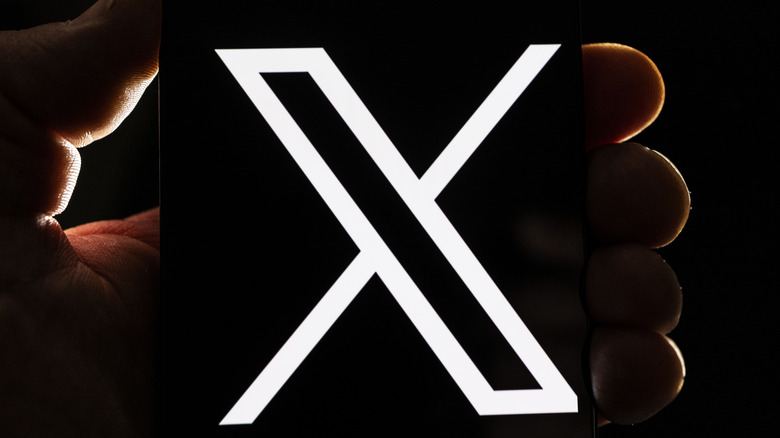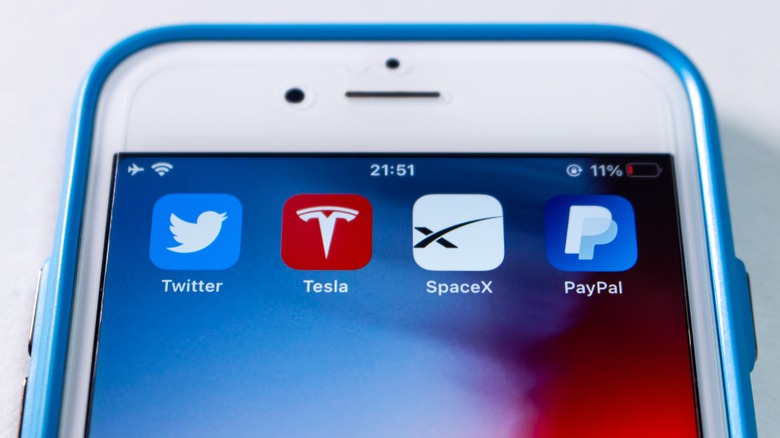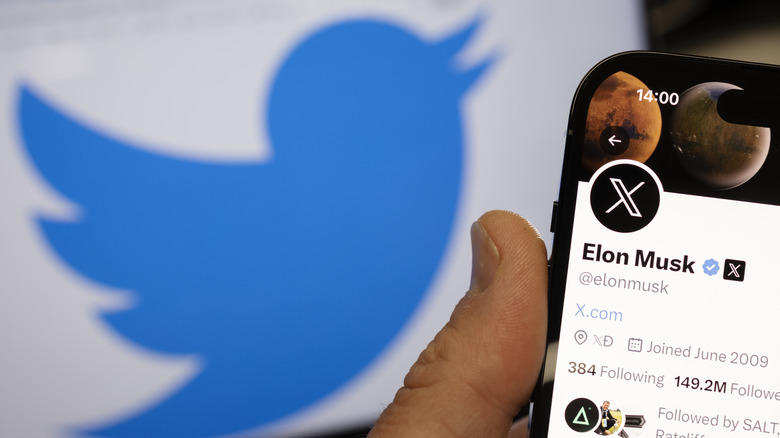Elon Musk Has Tried Rebranding As X Before, And Last Time It Didn't Go So Well
Elon Musk's latest change to Twitter may prove to be its biggest, or at least its most apparent — Musk announced plans to change the social media brand's name to "X." While Musk's plans to grow Twitter into a larger "super app" have not been a secret, it wasn't clear if or when Musk would change the actual name of the 17-year-old social network. On July 22, Musk tweeted that "we shall bid adieu to the Twitter brand."
The name "X" may seem familiar to anyone who knows about Elon Musk's life and career from before the billionaire bought a majority ownership of Twitter last year. He seems to think the letter is inherently cool and futuristic; it's found in the name of one of his other current companies — SpaceX — as well as in several of the names of Musk's children. This includes the child he had with musician Grimes, which the couple famously named "X Æ A-XII" (X being the first name).
Intriguingly, one of the first instances of this fascination of "X" was when Musk founded a company called X.com in 1999. That company was part of Musk's plan to revolutionize financial systems and introduce a new way of banking for the 21st century, and it didn't work out as he'd hoped. Understanding what "X.com" was supposed to be, and why it failed, may provide insight into what Musk's plans for the future of Twitter are.
'X.com' evolved into another familiar app used today
Even in his 20s, when Musk was working in the Canadian financial world, he looked to take big swings and make money by disrupting the system. He co-founded X.com, an FDIC-insured online bank, which was still a novel idea at the time.
By operating digitally, as well as instituting ideas that traditional brick-and-mortar institutions avoided, Musk envisioned X.com as the future of banking. Soon after, the company merged with a competitor — Peter Thiel's Confinity — and became PayPal. PayPal was then acquired by eBay in 2002 for $1.5 billion, and Musk moved on to other ventures.
Musk's time with X.com was short-lived, but he earned plenty of detractors. There was a lot of pushback from the company against Musk's strong desire to keep the name "X" over the new "PayPal" branding. Investors also didn't love some of his high-risk, disruptive ideas, which were less suited for a major financial company than in the tech world.
Customers were also unhappy with services as Musk instituted restrictions to save money, like a $1000 lifetime spending limit for PayPal users. Additionally, employees complained of harsh working conditions and toxic behavior by Musk, and eventually forced him out as CEO.
If you've been following the goings-on at Twitter since Musk took over in 2022, then a lot of this might sound familiar. Twitter users have been unhappy with Musk's controversial changes, and Twitter employees have complained about similarly poor working conditions, like having to sleep in the office. The latest change also echoes what happened at PayPal: Musk's aspiration to name the company "X."
Musk's plans for a 'super app'
Part of Musk's reasoning behind the purchase of Twitter (after he was more-or-less forced to do it) was its potential to become a "super app," or a company that merged several online services into one. The extremely popular Chinese-based WeChat app, which is an instant messaging, social media, and mobile payment company, is a prime example of what a super app could look like in the U.S.
The mobile payment and financial services arm of "X" is potentially the most lucrative. Musk has even claimed that his super app's modern way of banking could replace half of the financial system for the entire world.
With all this in mind, it's clear why Musk is fine with changing a company's name from a long-standing, well-recognized brand to a single letter of the alphabet. He envisions the text-based social network that has been Twitter's bread and butter since its founding to be a much smaller portion of the X super app. Instead, its financial services will be the lifeblood of X — just as X.com was a digital financial company. With the comparison so overt, it's not surprising that many people are wondering if Twitter — now the new "X" — will end up suffering the same fate as Musk's previous X.com.


